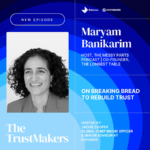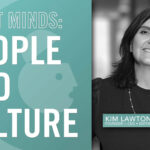By Katie Brown, Director of Business Strategy at Luquire
At a time when our industry is buzzing about summer, Cannes campaigns, and Pride activations, we may have missed something.
June included Global Loneliness Awareness Week—and if you’re in marketing, there’s a good chance you didn’t even know that. I almost didn’t either.
And that’s the problem.
I’ve spent years on teams working to build brands that aim to connect with people—through stories, communities, culture. This isn’t new – it’s the heartbeat of our industry. But something hit me recently, as I sat in a room full of colleagues, workshopping a “human angle.” We barely looked up from our screens. We were all each in our own AI bubbles creating hypothetical humans and situations. We were talking about connection, but were we actually working to create it?
We say we are. But let’s be honest: many of the tools we build, campaigns we run, and experiences we architect are doing the opposite. We’re pushing people deeper into curated feeds and filtered envy. We’re delivering “personalized” content that makes you feel more alone in your algorithmically determined silo. We’re engineering experiences that look like community but feel like comparison.
And I say “we” because I’m in it too.
I’m a strategist and a marketer, a maker of insights and ideas. But I’m also a mom, a partner, a friend—and some days, I’m just another human trying not to drown in a sea of “likes” that don’t mean anything and notifications that never end.
And I’m wondering: if I feel this way, what are we doing to everyone else?
Loneliness Is the Epidemic Nobody in Our Industry Is Talking About
In 2023, the U.S. Surgeon General declared loneliness a public health crisis, citing the equivalent health impact of smoking 15 cigarettes a day. And yet, in an era obsessed with cause marketing, social good, and emotional storytelling, almost no major U.S. brand has taken meaningful, true ownership of this issue.
When you stop to think about it, loneliness is more universal than climate change, more personally painful than inflation, and more emotionally contagious than COVID. It doesn’t need a translation strategy. And still, we’re treating it like someone else’s problem. Worse: we might be fueling it.
Connection Theater Is Not the Same as Actual Connection
Most of us spend our days building brand moments designed to hold attention, not foster presence. We optimize for engagement, not enrichment. We reward FOMO over fulfillement. And frankly, we do it because it works.
We say we want to be “part of culture,” but the hard truth? Culture is lonelier than ever. So if we’re truly “in it”, we need to stop pretending that participation alone is progress.
So Now What?
Here’s what we’re challenging our agency—and our industry—to do this week and beyond:
1. Ask if your brand is solving for connection—or simulating it.
Simulated connection looks good in a brief. Real connection makes people feel seen, not targeted. This isn’t about guilt, it’s about clarity. Let’s ask if we’re designing to build actual relationships or just deliver more content?
2. Treat loneliness like the next great brand cause—because it is.
It’s unclaimed. It’s urgent. And it’s everywhere – elders, new parents, Gen Z-ers, agencies. It transcends demographics and defies segmentation. What other issue can you say that about?
3. Design for togetherness, not just traffic.
What would it look like if a brand measured success by the depth of connection, not just the breadth of impressions? How would your CX change if your KPI was “reduced loneliness” instead of “reduced friction”?
Brands Can’t Fix Loneliness. But We Can Stop Making It Worse.
Let’s think about how we can move beyond our favorite glossy anthem ads. Maybe we try quieter interventions, holding intentional space and real presence within our brand work. Human-first creative that respects attention while cultivating connection.
We work in an industry that shapes how people experience the world, and we know that comes with responsibility. Let’s bravely think about what we – and the brands we champion – can do about loneliness. Maybe even, together.











